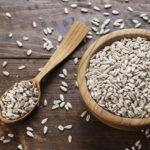 (NaturalHealth365) Thanks to modern-day agricultural and food processing practices – complete with long-distance travel, environmental radiation, and pesticide application – conventionally raised food often lacks essential nutrients like vitamin E.
(NaturalHealth365) Thanks to modern-day agricultural and food processing practices – complete with long-distance travel, environmental radiation, and pesticide application – conventionally raised food often lacks essential nutrients like vitamin E.
And, while – conventionally speaking – deficiencies in vitamin E are ‘rare,’ it’s still an excellent idea to eat foods packed with vitamin E to ensure you’re getting the proper daily amount (keep reading – we’ll talk about this more later).
As for one of the most affordable, delicious, and healthiest sources of vitamin E, look no further than the nut (and seed) section of your favorite grocery store. Today, we’ll focus on the health benefits of organic sunflower seeds.
Why putting sunflower seeds in your next salad is a great idea
Just one serving of sunflower seeds, or about 1 ounce of them dry roasted, contains nearly 40% of your recommended daily intake of vitamin E. But, you may be wondering, ‘Why is vitamin E so important for a healthy body?’
Check out a few of this vitamin’s most notable health benefits:
Fights off harmful free radicals
Vitamin E, also known as alpha-tocopherol, is a fat-soluble compound with potent antioxidant properties. This vitamin is crucial in protecting your body against free radicals – unstable molecules produced during normal metabolic processes that can cause oxidative stress.
Over time, these free radicals can damage cells and tissues, contributing to premature aging and various chronic diseases. Vitamin E helps maintain cellular integrity and overall health by neutralizing these harmful molecules.
Reduces the risk of heart disease
Research has shown a strong association between adequate vitamin E levels and a reduced risk of cardiovascular disease. This protective effect is largely attributed to vitamin E’s anti-inflammatory properties, which help reduce inflammation in the blood vessels – a key factor in the development of heart disease.
Additionally, vitamin E’s ability to prevent the oxidation of LDL cholesterol further supports heart health by reducing plaque formation in the arteries.
Contributes to many physiological and metabolic processes
Vitamin E is essential for various physiological and metabolic processes in the body, including immune function, cell communication, and gene expression. It supports the immune system by enhancing the production of white blood cells, which are critical for defending the body against infections.
Vitamin E also plays a role in cell signaling, helping cells communicate effectively and respond to environmental changes. Moreover, it influences gene expression, which governs many aspects of cellular function, growth, and repair.
In addition to providing you with an impressive 7.4 milligrams of vitamin E per serving, sunflower seeds are also a great snack option because they have been shown to:
- Provide a good source of magnesium, which is essential for everything from mood to skeletal muscle function
- Contain compounds called phytosterols, which support healthy cholesterol levels
- Contain selenium, another essential nutrient that supports thyroid function and DNA repair processes
Here’s an important health tip: If you’re getting sunflower seeds, look for the organic variety, as conventional brands will tend to be contaminated with unwanted chemicals. You may also enjoy sunflower seed butter – as a delicious dip or spread.
Other sources of vitamin E – and how much you should aim for every day
Wondering what the recommended daily intake of vitamin E is? According to the Food and Nutrition Board at the Institute of Medicine of The National Academies, it’s 15 milligrams per day for people aged 14 and up and 19 milligrams for lactating mothers.
If you want to get more objective data, ask your holistic physician for some blood work. A normal level of vitamin E is around 5.5 – 17 milligrams per liter (mg/L) of blood. If you have less than 4 mg/L, you may need to speak with your healthcare provider about supplementation or a significant change in your diet.
In the meantime, stock up on your high-quality organic sunflower seeds and these other delicious and natural sources of vitamin E: nut butter, pistachios, pine nuts, Brazil nuts, pumpkin seeds, hazelnuts, broccoli, kiwi fruit, spinach, red peppers, mangoes, spinach, Swiss chard, wild-caught salmon, almonds and avocados (to name a few.)
It’s a delicious way to take better care of yourself.
Sources for this article include:
NIH.gov
NIH.gov
GlobalHealingCenter.com
MedicalNewsToday.com
MayoClinic.org
Healthline.com
No hay comentarios:
Publicar un comentario